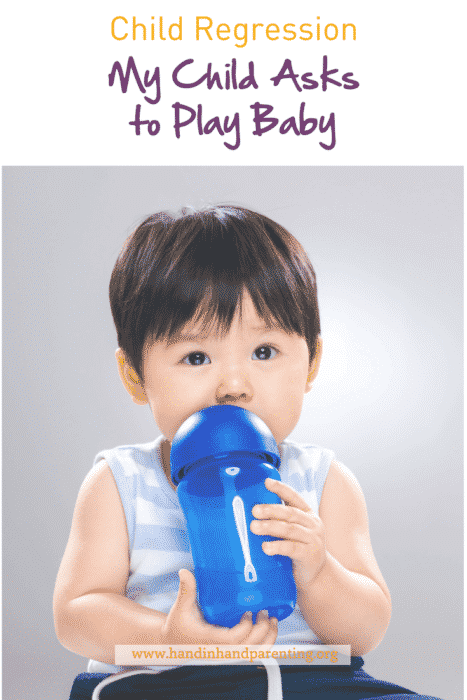 When he was four years old, mom Laura Minnigerode and her son Lucian set aside time to play each morning one on one, as a way to encourage connection. This devoted “Special Time” happened most days once Lucian’s two older two siblings left for school. After the rush of getting them out the door, Laura would have almost an hour before it was time to take Lucian to preschool.
When he was four years old, mom Laura Minnigerode and her son Lucian set aside time to play each morning one on one, as a way to encourage connection. This devoted “Special Time” happened most days once Lucian’s two older two siblings left for school. After the rush of getting them out the door, Laura would have almost an hour before it was time to take Lucian to preschool.
During that time, he made a very specific request about what he wanted to play each day, with instructions about what Laura should do. He wanted to be a baby again.
“He would get into a box or laundry basket and crouch down. I would be a delivery person and deliver him to a house. I was instructed to ring the doorbell. Sometimes he would give me really specific steps about how to set him down, “No, you have to set me down first before you can ring the doorbell,” but other times he would not say anything if I rang the doorbell while holding him.
“I would ring the doorbell and leave and then come back and be the person opening the door. He would stay crouched down while I opened the box. Each time, I would be incredibly surprised and thrilled to find a baby being delivered to my door. He always made a baby sound, like, “Wah!”
“I was always so happy to see him and gave him so many kisses and he always laughed at my shock,” says Laura, who is also a schooler educator and Hand in Hand Parenting Instructor.
Does Your Child Ask to Play Baby?
Does your child act like a baby? Baby play is very common. Kids make sense of the world through their play, and we can be sure that they will use play to work through issues they face.
When a child asks to play baby, it could be for a number of reasons.
Often big kids want to play baby to settle fears they have about being replaced when younger children arrive. Meanwhile, younger kids may be stretching towards new independence, but want to be babied when that feels hard. Even teenagers, after long bouts of fighting to be alone or independent, may suddenly swing their arms around you and cuddle in close. Although they probably won’t ask to be cradled in a linen basket, this is still a form of regression and works in much the same way as preschoolers asking to play baby.
Sometimes we don’t know what a child is working on, and that’s ok. Kids choose play to examine what fascinates or enthralls them, scares them or to gain understanding. Laura didn’t question why her son wanted to act like a baby, but she did see the effects. Playing with Lucian in that very specific way helped “fill his cup,” just the way he needed, she says. She also noted that after those sessions of Special Play where he roleplayed being a baby, his drop-off to preschool later felt easy. He was happy to wave goodbye. “Every school day that year was so delightful for him,” Laura says. So, if your child asks to play baby, don’t be alarmed. Responding to these moments of regression with empathy and love is a great plan. The warmth and loving attention that a child receives through this kind of baby play is likely just what he or she is seeking.
Why Parents Have a Hard Time Playing Baby
Sometimes, when a child asks to play baby, it can feel hard for parents to get onboard. Why? Here are some common concerns we hear at Hand in Hand Parenting.
- You may already have a baby to deal with, and it just feels too much when your older child wants to be treated like a baby too
- You may have been relieved when the baby years were done and it feels hard to go back
- You may be physically tired if your child wants you to pick him up and transport him like a baby
- You may worry you are encouraging your child in unnatural behavior
- You question whether your child didn’t get what they needed as a baby
- You found babyhood a really difficult time, for whatever reason
- It feels embarrassing to play baby now he or she is so big
- You may be concerned your child is not developing age appropriately
- You had to grow up fast as a child, and it feels unnatural or silly to play this way
Note the particular feelings that come up for you if you get impatient or anxious around this kind of play. If you have a Listening Partner, work on the subject there. You might want to think about how it felt to be a parent to this child as a newborn. You might say things you wished you had said then but didn’t. You might talk
What Should I Do When My Child Wants to Act Like a Baby?
Go with it! Love on your child just as they ask, with as much affection as you did when they were a baby. Admire, cuddle, says things you may have said when he or she was a baby. Piling on that attention gives your child exactly what he or she needs.
 Give a Child Regular Time To Act Like a Baby
Give a Child Regular Time To Act Like a Baby
Devoting regular moments of Special Time like Laura did gives a child ample opportunity for a child to use roleplay to work on issues and fears. The added benefit with Special Time because you set it up for a specific timeframe, using a timer to signal the start and finish, you can make these moments
Set the time to the most you can stay warm and encouraging when your child is acting like a baby in Special Time.
What To Do When a Child Acts Like An ‘Annoying Baby’
It’s one thing to respond warmly when your child is acting like a baby being cute and adorable, but what happens when they mimic the whining, pleading and crying of their baby years? What if they repeat behavior that drove you crazy?
Again, focus on answering the underlying call for closeness and attention. You can set a limit on the behavior without undermining the element of baby play. Hold them close, cradle them, tell them no gently and sweep them up off the ground. Hold them close to stop the action. Using a tool we call the Vigorous Snuggle to respond also helps keep things light, loving and playful.
But notice that these times can be emotionally draining for you. It’s ok not to want to play, and it’s ok to set limits around this play. If you need to, you can try allowing two minutes of extra Special Time for that “annoying” behavior. A “baby whining session” for instance where you listen to your preschooler for just that small limited amount of time.
Make Up Your Own Baby Games
Games give permission and safety for children to explore their feelings and resolve tension, and they can also ease the tension for us too! Laughter and giggles are nature’s tension relievers, so keep an ear out for them to know your child’s feelings are being addressed and heard. If your child often wants to play baby, initiating this type of play can be useful and feels good for both sides.
1 – Get out the dolls:
Use a soft toy or doll and act out baby play with them and see where your child leads this play. They may want to mother the baby or stamp on it. Go where the giggles are and you’ll be on the right track.
It might be fun to baby a toy that needs no babying at all. Try it with a “grown-up” Barbie, transformer, or even a mop or brick. Again, follow the lead your child takes.
2 – Cranky Baby!
See how your child feels about mothering you! They may enjoy seeing how it is to “feed” you pretend baby mush, or give you a bottle. You might try crawling with them, or roleplay learning to walk and fall on your butt. My son liked listening to me babble away in baby language and he LOVED telling me what to do!
3 – Silly Parent
Your turn to act like a helpless, hopeless parent – to get some laughs! When your child is acting perfectly preschoolish, “mistake” him for a baby, and tell him it’s time for a diaper change, or to put on his onesie, put his drink in a baby bottle or some other thing he’s grown out of.
Wrap up a loaf of bread in a blankie and introduce your “new baby,” and when your child points out the bread say, “of course, this bread isn’t nearly as darling as you!”
Hand in Hand Instructor Emily Gray Murray “confuses” her children, putting the older one in the stroller or the car-seat and then scratches her head when they delightedly point out her error.
4 – Let me Look at My Baby!
In his book Playful Parenting, author Lawrence Cohen describes playing a game with an older sister who demanded her mom stop always looking at the baby. Cohen tells her that he will “look at her,” and proceeds to admire her elbow, her head, looking with closeness and intensity as she giggles. Her mom follows this lead later, looking deeply into her eyes, and then reports back that instead of making an indirect request – saying “stop looking at the baby,” he daughter starts to ask instead, “Please look at me.” She feels able to ask for exactly the attention she needs to recover her place in the family after the baby arrives.
Baby Play is Normal and Natural
It may seem strange when your child wants to act like a baby at first, but know that is is a common request and is entirely normal. Use the ideas here to give yourself 100 percent to playing like this when your child wants to play baby. There’s every possibility that it will come to represent a special moment in your relationship, one that will later be cherished.
Let us know what you think of the ideas here. Does your child want to act like a baby? How do you respond?
Learn how to make the most of Special Time and get a free special time checklist